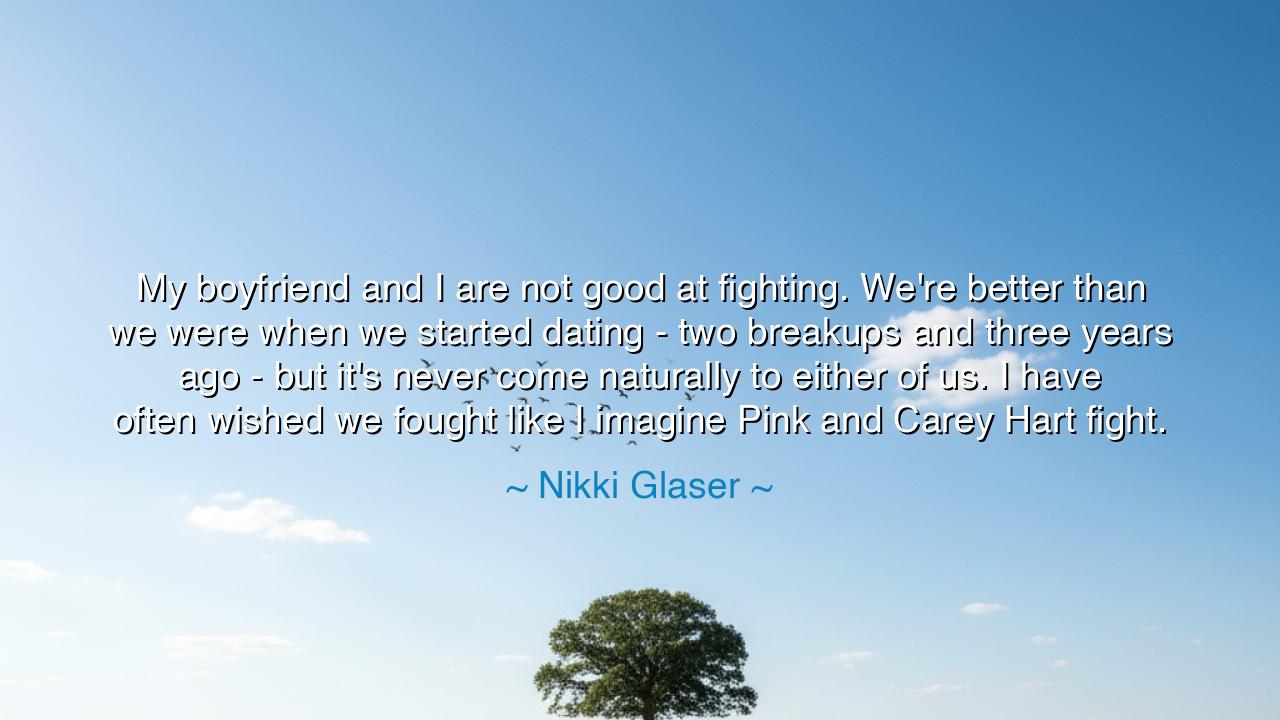
My boyfriend and I are not good at fighting. We're better than we
My boyfriend and I are not good at fighting. We're better than we were when we started dating - two breakups and three years ago - but it's never come naturally to either of us. I have often wished we fought like I imagine Pink and Carey Hart fight.






In the vulnerable and piercingly honest words of Nikki Glaser, the comedian who cloaks truth in laughter, we find a revelation about love that is as old as time: “My boyfriend and I are not good at fighting. We're better than we were when we started dating—two breakups and three years ago—but it's never come naturally to either of us. I have often wished we fought like I imagine Pink and Carey Hart fight.” Though her words emerge from the casual rhythm of modern confession, their essence carries the deep, enduring wisdom of human struggle—the recognition that conflict is not the enemy of love, but one of its necessary languages. In her humor and humility, Glaser reveals what the ancients knew well: that love is not tested in moments of calm, but in the tempests that shake its foundations.
Nikki Glaser, known for her sharp wit and fearless candor, here sheds her armor of irony and allows us to glimpse the heart of a woman learning, painfully and beautifully, the craft of intimacy. She speaks of the awkwardness of fighting, of the discomfort that comes when two souls must stand not as lovers but as opposites, learning to face one another’s flaws without turning away. Her words remind us that even love, in its purest form, demands skill and practice. The phrase “we’re better than we were” speaks not of perfection, but of growth—a sacred evolution that comes only through time, mistakes, and forgiveness. To love well, one must also learn to fight well, and that lesson is seldom easy.
Her reference to Pink and Carey Hart—the musician and her husband, whose fiery relationship is well known—serves as both humor and aspiration. Glaser imagines them as warriors of passion, lovers who clash not in cruelty but in vitality, whose arguments, though fierce, end in renewed connection. In invoking them, she hints at a paradox: that the absence of conflict is not peace, but stagnation. Love that never struggles may never deepen. The ancients, too, understood this dance of opposites. In the myth of Eros and Psyche, love and soul are torn apart by mistrust and reunited only through trials. Their strife becomes their salvation. So it is with modern lovers—the storm, when weathered, refines the heart.
But Glaser’s reflection also carries a quieter sorrow—the wish that conflict might come “naturally.” This yearning is one familiar to all who fear confrontation yet crave honesty. Many hearts avoid the necessary heat of disagreement, mistaking peace for harmony. Yet true harmony, as the musicians of old would tell us, is not found in sameness but in balance between dissonant notes. Conflict, when guided by care, is not destruction but creation—the shaping of a bond resilient enough to endure both joy and pain. In this, Glaser’s words echo the wisdom of ancient philosophers, who taught that even the cosmos itself was born of tension, of chaos finding order.
Consider the story of Marcus Aurelius and Faustina, the Roman emperor and empress whose marriage was famed for its turbulence. Historians wrote of their arguments as fierce and unyielding, yet their bond endured through decades of rule, loss, and war. Marcus, in his meditations, spoke not of avoiding hardship but of embracing it as the forge of character. So too, in relationships, it is through the honest clash of wills that understanding is born. Those who never fight may never truly know one another; those who fight with respect may build something stronger than passion—trust.
There is also tenderness in Glaser’s confession of imperfection. She does not glorify her relationship nor despair of it; instead, she stands within it, learning. Her words remind us that love is not a static state but a living practice, shaped day by day through trial and tenderness. Two breakups, three years, a thousand lessons—it is the story of every partnership that strives to endure. Her humility, her wish to do better, is itself a form of wisdom. For love is not about mastery—it is about willingness. To return after the breaking, to try again, to speak when silence would be easier—these are acts of quiet heroism.
And so, my children of the heart, take this lesson from her: do not fear the fight, but learn its art. When you love, love bravely enough to speak the truth, even when it trembles. Let your conflicts be guided not by pride, but by the desire to understand. Argue not to win, but to connect. When anger rises, remember that it is the shadow cast by love’s intensity. If you can endure the storms together, the calm that follows will be deeper, truer, and more sacred than peace born of avoidance.
For as Nikki Glaser teaches, even in jest, love is not effortless—it is a discipline, a practice of patience and vulnerability. The strongest bonds are not those that never break, but those that learn how to mend. Let your relationships, then, be like the ancient vessels of clay—cracked, perhaps, but made more beautiful by the gold that fills their fractures. In the end, love’s perfection lies not in its calm, but in its courage to keep beginning again.






AAdministratorAdministrator
Welcome, honored guests. Please leave a comment, we will respond soon